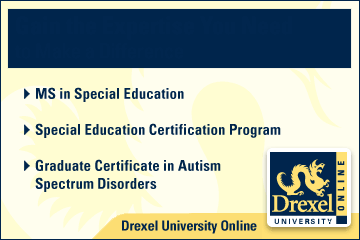| Dear NASET Members Welcome to NASET's </font>WEEK in REVIEW. Here, we provide you with the latest publications from NASET to read and download, as well as some of the most interesting issues that have happened this week in the field of special education. We hope you enjoy this publication. Feel free to send us articles for this publication or let us know your thoughts about the WEEK in REVIEW at news@naset.org. Have a great weekend.
Sincerely,
NASETNews Team |
| NASET Sponsor - DREXEL ONLINE To learn more |
| New This Week on NASETThe Practical Teacher
Trouble-Shooting Reward Programs: A Teacher's Guide
Many teachers use reward programs to help reinforce positive student behaviors. However, sometimes these programs are ineffective or are effective for a while and then lose its impact. What can teachers do to make their reward systems work? How do they find rewards that the students actually finds reinforcing? What can they do when students argues with them every time they use a reward program These questions and others on reward programs will be addressed in this issue of NASET's Practical Teacher. ____________________________________________________
Parent Teacher Conference Handout
Diagnostic Symptoms of Dyscalculia (Math Learning Disability)In this Issue:
Many parents may not understand the specific symptoms in reading, math, spelling or writing that may signify a serious learning disability. This Parent Teacher Conference Handout provides parents with the symptoms that may reflect a serious learning disability in the area of mathematics. Children with this type of learning disorder may exhibit:
____________________________________________________
Classroom ManagementSeries V
Research Based Strategies for the Classroom
Part #7 - Cooperative GroupingIn this Issue:
Cooperative learning is actually a generic term that refers to numerous methods for grouping students. At least 10 different methods have been formally described in the research literature. Therefore, "cooperative learning" as a strategy requires a closer look to take advantage of potential benefits for learners. Effective cooperative learning occurs when students work together to accomplish shared goals and when positive structures are in place to support that process (Johnson & Johnson, 1999). Even though appropriate use of student groups for learning has been shown to yield significant learning improvement across disciplines, the successful application of cooperative grouping in classrooms still eludes many educators (Johnson & Johnson). This issue of the Classroom Management Series provides research findings and implementation examples.
|
| NASET Sponsor - HEINLE, part of Cengage Learning |
| First Direct Evidence That ADHD Is a Genetic Disorder: Children With ADHD More Likely to Have Missing or Duplicated Segments of DNA
New research provides the first direct evidence that attention-deficit/hyperactivity disorder (ADHD) is a genetic condition. Scientists at Cardiff University found that children with ADHD were more likely to have small segments of their DNA duplicated or missing than other children. The study also found significant overlap between these segments, known as copy number variants (CNVs), and genetic variants implicated in autism and schizophrenia, proving strong evidence that ADHD is a neurodevelopmental disorder -- in other words, that the brains of children with the disorder differ from those of other children. The research, published in the journal The Lancet, was largely funded by the Wellcome Trust, with additional support from Action Medical Research, the Medical Research Council and the European Union. To read more, click here |
| Program Enables the Adoption of Foster Children with DisabilitiesWhen S.M. became a foster child four years ago, she didn't speak a word. At age 7, S.M., who suffers from mental retardation, had just been removed from her birth parents, who had neglected her. Caring for the little girl was going to cost money, and lots of it. Like most foster children with serious disabilities, S.M. was expected to ``age out'' of foster care -- remaining in state custody until she turned 18. As a foster child, taxpayers would pay for much of the youngster's care, but few prospective adoptive parents were willing -- or able -- to take on such an expense. But thanks to the efforts of administrators at two state agencies, the girl, now 11, will spend the rest of her childhood with a mom and a dad. On Wednesday morning, S.M., who's not being identified by The Miami Herald to protect her privacy, was adopted by the Modls, a Haitian-American couple from Miami who had been caring for the youngster as foster parents. To read more, click here |
| Teaching Interns Illegally Rated as "Qualified"California has violated federal law by classifying thousands of inexperienced, noncredentialed teachers as "highly qualified" and assigning them to schools with heavily low-income and minority enrollments, a federal appeals court ruled Monday. The ruling by the Ninth U.S. Circuit Court of Appeals in San Francisco was a victory for impoverished families in Richmond, Hayward and Los Angeles who filed suit in 2007. They claimed their schools were saddled with disproportionate numbers of untrained interns because of federal and state regulations that flouted federal law. The appeals court ruled 2-1 against the families in July 2009, saying the federal No Child Left Behind Act leaves such decisions largely up to the states. On Monday, after reviewing further arguments, the same panel reversed itself, reinterpreted the law and ruled 2-1 against the government. The ruling doesn't require school districts to fire interns or bar them from teaching core subjects. But it requires districts in California - and potentially other states - to change their assignment policies so that the least-prepared teachers are not routinely placed in the neediest schools, said John Affeldt, a lawyer for the families. To read more, click here |
| Did You Know That.....In the field of special education, differences in culural beliefs and linguistic practices of professionals and families often serve as barriers to parent involvement (Hewrad, 2009). |
| Daycare Puts Children With Lung Disease at Risk for Serious Illness, Study FindsExposure to common viruses in daycare puts children with a chronic lung condition caused by premature birth at risk for serious respiratory infections, according to a study from Johns Hopkins Children's Center published in the October issue of Pediatrics. The researchers say their findings should prompt pediatricians to monitor their prematurely born patients, regardless of age, for signs of lung disease and to discuss the risks of daycare-acquired infections with the children's parents. These risks, the researchers found, include increased emergency room visits and medication use and more days with breathing problems. "Daycare can be a breeding ground for viruses and puts these already vulnerable children at risk for prolonged illness and serious complications from infections that are typically mild and short-lived in children with healthy lungs," said lead investigator Sharon McGrath-Morrow, M.D., M.B.A., a lung specialist at Hopkins Children's. To read more, click here |
| New National Autism Clearinghouse Being CreatedA handful of disability organizations are joining forces to establish a national resource center to assist people dealing with autism and other developmental disabilities. The new initiative known as Autism NOW: The National Autism Resource and Information Center will be established by The Arc in collaboration with the Autistic Self Advocacy Network and Self Advocates Becoming Empowered with the help of $1.87 million awarded by the Department of Health and Human Services this week. Autism NOW will be tasked with helping people connect with services and interventions in their own communities. A key feature of the new center, organizers say, is that self-advocates will be integral in forming and operating it. To read more, click here |
| The Impact of ADHD in the WorkplaceAttention deficit hyperactivity disorder - known as ADHD - is a neurobiological disorder characterized by inappropriate impulsivity, inattention and, possibly, hyperactivity. It's possible that this often-misunderstood condition may be interfering with your employees' productivity. Many people believe that ADHD is a condition that only affects children and that it is a condition that is connected more with disruptive students in classrooms than with people at work. But that view is not entirely accurate, says James Schuster, M.D., MBA, chief medical officer for Community Care, a behavioral health organization that is part of the UPMC Insurance Services Division. "ADHD is a well-known problem for some school-age children, but many times, its existence in adults is overlooked," Schuster says. "It's important to understand that ADHD in adults is not a rare condition." Smart Business spoke with Schuster about ADHD in adults, its impact in the workplace and how best to treat it. To read more, click here |
| Judge Rejects D.C. Bid to Drop Special Education CaseA federal judge has denied a District motion to drop the 15-year-old injunction that oversees payments to private special education schools attended by the city's schoolchildren at public expense. D.C. Attorney General Peter Nickles, citing improved performance and an influential U.S. Supreme Court ruling, had asked U.S. District Judge Paul L. Friedman to drop the injunction in the Petties class-action suit. The action was filed by parents of special needs students who attend private schools because District public schools cannot serve their needs. The injunction helps ensure that D.C. pays private schools and other service providers in a timely and accurate manner. The city spends about $280 million a year in tuition and transportation for an estimated 2,500 special-needs students in private schools, an expense it has been trying shrink. To read more, click here |
| TRIVIA QUESTION OF THE WEEKGuess the answer to this week's trivia question and we'll recognize you in next week's Week in Review. Congratulations to:
Kathryn Rousseau Christie Miller CJ Mitchell Lisa Rotella who correctly identified the answer to last week's trivia question: In what year did the federal law add explicit new provisions regarding the discipline of students with disabilities in schools? ANSWER: 1997 THIS WEEK'S TRIVIA QUESTION: Many students with disabilities have difficulties learning many things at one time. Teachers often need to break down complex or multistep skills into smaller, easier-to-learn assignments. What is the term that means "breaking down complex or multistep skills into smaller, easier-to-learn assignments"? If you know the answer, send an email to contactus@naset.org
All answers must be submitted no later than Monday, October 11, 2010 at 12:00 p.m. |
| NASET Sponsor - MAYER JOHNSON |
| In Massachussetts, Special Education Scores Remain TroublesomeIt's more of the same when it comes to the MCAS. Overall, students did well, but once again, special education students at the Alden School did not make adequate yearly progress under the federal No Child Left Behind Act. This is the sixth year in a row the school failed to reach its goal in English Language Arts for that group. In 2009, special-education students at Alden did make adequate yearly progress in math, but failed to do so this year. Special education students at the middle school also failed to make adequate yearly progress in both math and English. Special education math students at the middle school last failed to make adequate yearly progress in 2008. Last year, the Alden School was classified as being in need of "restructuring" due to the low scores among special-ed students. It remains at that status, and the middle school has now joined it. To read more, click here |
| Severe Food Allergies Turned Off in MiceJohns Hopkins scientists have discovered a way to turn off the immune system's allergic reaction to certain food proteins in mice, a discovery that could have implications for the millions of people who suffer severe reactions to foods, such as peanuts and milk. The findings, published online in the journal Nature Medicine, provide hope that the body could [under close medical supervision] be trained to tolerate food allergies that lead to roughly 300,000 emergency room visits and 100 to 200 deaths each year. The research team, led by Shau-Ku Huang, Ph.D., a professor of medicine, and Yufeng Zhou, M.D., Ph.D., a postdoctoral fellow in the Division of Allergy and Clinical Immunology at Johns Hopkins University School of Medicine, discovered that one kind of immune cell in the gastrointestinal tract called lamina propria dendritic cells (LPDC) -- considered the first line of defense for a body's immune system -- expresses a special receptor, SIGNR1, which appears on the cells' surface and binds to specific sugars.To read more, click here |
| Siblings of Children with Autism Have More Frequent Language DelaysA new study at Washington University School of Medicine in St. Louis has revealed that siblings of children with autism have more frequent language delays. "Researchers presume one child is affected, and the other is not, but our findings suggest that although one child may have autism while the other does not, it's very possible both children are affected to some degree by genes that contribute to autism," said John N. Constantino. The study found that approximately one in five siblings thought to be unaffected experienced language delays or speech problems early in life. Also, many female siblings had subtle traits, but few had full-blown autism spectrum disorders. Boys are thought to be affected four times more often than girls. To read more, click here |
| ADHD: Genes Play a Role, But How Crucial Are They?Anyone whose child has been diagnosed with attention-deficit hyperactivity disorder (ADHD) has good reason to feel exasperated. Last week a scientific squabble over what may or may not cause the behavioral problems associated with the condition spilled into the news. ADHD is the most common behavioural problem in Britain and is estimated to affect 3%-9% of schoolchildren. This is no single, well-defined disorder, but rather a group of symptoms that include impulsivity, difficulty concentrating, restlessness and fidgeting. The impact can be serious. The child might not be able to feed him or herself, may struggle to make and keep friends, and is at risk of underachieving. Since most perfectly healthy children are prone to these kinds of behaviours, diagnosing ADHD is not straightforward. The trouble began with a study in the Lancet medical journal by researchers at Cardiff University who found children with ADHD were more likely to have duplicate or missing chunks of DNA than other children. A press release from the Wellcome Trust, which partly funded the study, declared the work "the first direct evidence that attention-deficit hyperactivity disorder is a genetic condition". Professor Anita Thapar, who led the study, hoped the findings would lay to rest the myth that ADHD was down to bad parenting and poor diet. To read more, click here |
| Did You Know That.....A child's disability affects parents and siblings without disabilities in diffeent ways during the different life-cycle stages (Heward, 2009). |
| HUD to Provide $33 million to Fund Housing Assistance to Persons w/DisabilitiesU.S. Housing and Urban Development (HUD) Secretary Shaun Donovan announced yesterday that thousands of non-elderly Americans with disabilities will receive housing assistance to enable them to access affordable housing. Public housing authorities across the U.S. will distribute approximately 4,300 rental assistance vouchers to this population. HUD is awarding nearly $33 million to fund these vouchers through its Rental Assistance for Non-Elderly Persons with Disabilities Program. The grants announced today are part of the $40 million HUD made available last April to help public housing authorities (PHAs) across the country fund rental vouchers for non-elderly persons with disabilities. PHAs could apply for funding under various categories: To read more, click here |
| Board Certification in Special Education Available to NASET MembersThrough an agreement with The American Academy of Special Education Professionals (AASEP), NASET> members now have the opportunity to achieve AASEP Board Certification in Special Education - (B.C.S.E.) at a reduced fee. AASEP Board Certification in Special Education - (B.C.S.E.) is a voluntary choice on the part of the candidate. The candidate for Board Certification wishes to demonstrate a commitment to excellence to employers, peers, administrators, other professionals, and parents. From the standpoint of the Academy, board certification will demonstrate the highest professional competency in the area of special education. Board Certification in Special Education establishes a much needed standard for professionals, across disciplines, who work with exceptional children. For more information on Board Certification in Special Education, click here |
|



